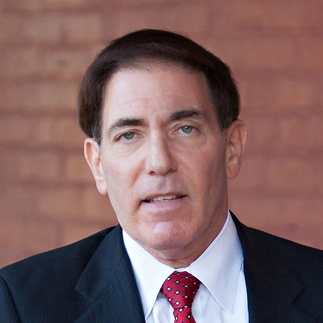
Jude C. Bursavich
jude.bursavich@bswllp.com
Jude C. Bursavich is a Martindale AV® rated partner in the Baton Rouge offices of Breazeale, Sachse & Wilson, L.L.P., and a member of the firm’s Management Committee. Mr. Bursavich practices in the area of complex business and commercial litigation, and has concentrated on business protection issues for more than thirty years. He represents both individuals and local and national companies in business matters.

Murphy J. Foster, III
murphy.foster@bswllp.com
Murphy Foster is a partner in the Baton Rouge office of Breazeale, Sachse & Wilson, L.L.P. and a member of the firm’s Management Committee. His principal areas of practice include construction litigation and employment and traditional labor law. He brings over 40 years of experience representing businesses in Construction and Labor matters and has successfully litigated numerous high profile construction and employment cases throughout the country. Mr. Foster is the former Chairman of the Labor & Employment Law section of the Louisiana State Bar Association and is a member of the Construction Industry team as well as the Labor & Employment Practice section at Breazeale, Sachse & Wilson.

Philip Giorlando
philip.giorlando@bswllp.com
Philip Giorlando is a partner in the New Orleans office of Breazeale, Sachse & Wilson, L.L.P., in the Labor and Employment Law section. Philip has advised clients on numerous labor and employment issues, including FMLA & ADA compliance, Federal Wage and Hour Guidelines, and avoiding discrimination in business succession planning to many different industries including, Banking, Hospitality, Hospital/Healthcare, Charter Schools, and City Governments throughout the State. Philip also represents local and national corporations, local municipalities, and other entities across many industries in the defense of employment discrimination and wage-and-hour lawsuits, as well as administrative charges and investigations brought by employment law regulatory agencies, including the Department of Labor and Equal Employment Opportunity Commission.

Alexandra Cobb Hains
alex.hains@bswllp.com
Alex Hains is a partner in the Labor and Employment section of the firm. She represents private and public employers in a broad range of labor and employment matters. Alex has been recognized by Best Lawyers and Louisiana Super Lawyers for labor and employment law.

Kayla M. Jacob
kayla.jacob@bswllp.com
Kayla Jacob is an associate in the Labor and Employment section of the New Orleans office. Kayla enjoys advising clients on numerous labor and employment issues and developing effective preventive maintenance programming for clients in many different industries. She has successfully represented clients in administrative proceedings before the Louisiana State Civil Service Commission, the Equal Employment Opportunity Commission, and in litigation involving sophisticated motion practice and complex legal issues.

Rachael Jeanfreau
rachael.jeanfreau@bswllp.com
Rachael Jeanfreau is a partner in the New Orleans office, practicing in the areas of labor and employment law and commercial litigation. Ms. Jeanfreau received her Juris Doctor from Tulane University Law School, magna cum laude, in 2011 where she was a member of the Tulane Law Review. She received her Bachelor of Arts from Louisiana State University, summa cum laude, in 2007.

Eve B. Masinter
eve.masinter@bswllp.com
Ms. Masinter is a litigator in the areas of employment, business, and healthcare, including class action defense. She has longstanding experience in trial and appellate practice in both federal and state courts. She has successfully represented private and public entities before multiple federal and state appellate courts. She handles administrative matters with the EEOC, DOL, and OSHA. She also opines on insurance coverage. Ms. Masinter represents management in injunction proceedings involving Unions, litigates non-compete cases, as well as cases involving state and federal employment laws and regulations. She regularly conducts employer and supervisor training on topics such as avoiding discrimination, harassment and retaliation in the work place, the hiring, discipline and termination of employees, and on various employment laws.

E. Fredrick Preis, Jr.
fred.preis@bswllp.com
Fred Preis is a partner in the New Orleans office where he is a senior member of the labor and employment law section. Prior to serving as an officer in the United States Army, Fred earned both his undergraduate degree in business and his law degree from Louisiana State University. He has been representing management in labor law and employee relations matters throughout the United States for more than 30 years.

Melissa M. Shirley
melissa.shirley@bswllp.com
Melissa Morse Shirley, a partner in the Baton Rouge office, practices in the areas of labor and employment law, including litigation, transactional, administrative and counseling matters. Her clients include petrochemical companies, health care industry organizations, gaming industry companies, retail businesses, food service industry clients, financial institutions, contractors, universities, law firms and a number of governmental entities. Ms. Shirley became a Partner with Breazeale, Sachse & Wilson in 2002. She has served on the Firm’s recruiting committee since 1999 and previously served as the firm’s Recruiting Partner. Ms. Shirley also serves as the manager of the firm’s labor and employment team.

Scott D. Wilson
scott.wilson@bswllp.com
Scott D. Wilson is Of Counsel in the Baton Rouge office of Breazeale, Sachse & Wilson, L.L.P., where he focuses on labor and employment law. With more than 30 years of experience, he represents clients in litigation, counseling, and compliance matters involving Title VII, the ADA, the ADEA, the Pregnant Workers Fairness Act, and other state and federal laws.
Mr. Wilson has litigated more than 185 cases in federal district courts and over 35 appeals before the U.S. Court of Appeals for the Fifth Circuit, securing several landmark reversals. In addition to litigation, he regularly advises employers on workplace policies, investigations, administrative charges, and mediations. His combined trial and counseling experience make him a trusted resource for businesses navigating complex workplace challenges.
